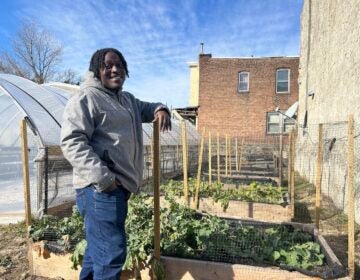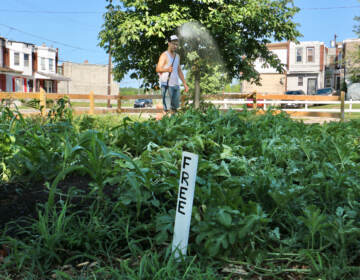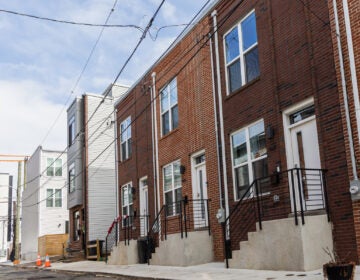Philly City Council passes Land Bank acquisition bill considered key to garden land security
Advocates say the bill preserves an important tool for protecting garden land from development.
Listen 1:08
Sunflowers tower over a People's Kitchen garden at 61st and Reinhard streets in Southwest Philadelphia. (Emma Lee/WHYY)
Have a question about Philly’s neighborhoods or the systems that shape them? PlanPhilly reporters want to hear from you! Ask us a question or send us a story idea you think we should cover.
Philadelphia’s Land Bank will continue to get priority over other bidders to buy tax-delinquent land through sheriff sale, under a bill City Council passed unanimously Thursday. Tax sales in Philly have been paused for years but could resume this summer.
Advocates consider the bill key to saving community garden land — much of which is not owned by gardeners — from development.
“We have seen residents who have faced decades of disinvestment in our neighborhoods take the initiative to clean up abandoned lots and transform them into vibrant community spaces through gardening,” Councilmember Kendra Brooks, the bill’s co-sponsor, said during a committee hearing last week. “In the absence of this official legislation, many of our community gardeners are considered squatters by the city.”
Land insecurity is the top issue facing growers in Philly, a 2023 city plan for supporting urban agriculture found. At least 140 gardens in the city have been lost since 2008, some due to development. An estimated one in three active gardens and farms are located in fast-developing areas of the city.
“Nothing that we grow or build … has any real permanence until we own the land,” Michael Gonzalo Moran, a board member at Iglesias Garden, testified last week. He said the gardens bring peace and serenity to the Norris Square neighborhood. “If that land is taken out from under us, then what have we done — other than make a few memories?”
Most active gardens and farms in Philly are located in high-poverty areas of the city and areas where more than half of residents are people of color, the city’s plan found.
“This is an environmental issue, a public safety issue and a racial justice issue,” Brooks said.
The city’s Land Bank acquires vacant, tax-delinquent land through sheriff sale and disposes of property to private buyers. It can transfer land at nominal or discounted prices when it’ll be used for specific purposes, including affordable housing and community gardens. State law gives land banks priority over other bidders in acquiring land in some situations.
The bill passed Thursday lets other interested parties require open bidding when the Land Bank seeks to exercise its right to be the sole bidder at sheriff sale. It also lets prior owners redeem property the Land Bank buys through sheriff sales if the prior owner can pay the Land Bank back within 60 days.
These changes allow the Land Bank to “lawfully exercise its priority bid authority under state law,” said Land Bank Executive Director Angel Rodriguez during last week’s committee hearing.
“The administration, city solicitor and Philadelphia Land Bank drafted and introduced this bill so that the Philadelphia Land Bank can resume fulfilling an important part of its intended mission of returning tax delinquent, vacant and underutilized property back to productive use,” Rodriguez said.
Tax sales have been paused for roughly three years. Mayor Cherelle Parker announced in her budget address this spring that her Law Department was working with Sheriff Rochelle Bilal to prepare to resume sales, with the goal of doing so by July 1.
Part of a plan to reverse the impact of a decades-old lien sale
Last year, the city executed a $1.1 million deal to buy back the liens, or legal claims on property to secure the payment of debt, on 91 parcels currently used as community gardens, mostly in West, Southwest and North Philly.
The city had sold these liens — along with thousands of others — to a private lienholder in 1997 in an attempt to raise revenue. But the plan didn’t fully pan out, and the arrangement meant the private lienholder could bring the parcels to sheriff’s sale at any point, allowing developers or speculators to buy the land out from under gardeners.
“As the property values rise, the threat to these gardens is growing,” Brooks said. “Once the land is sold, we never get it back — and we lose the opportunity to make Philadelphia a greener, more beautiful city for our children.”
The lien buyback, which Brooks spearheaded, was considered the first step in securing the parcels for agriculture. With the city holding the liens again, city officials could decide whether and when to bring the tax-delinquent parcels to sheriff’s sale.
But unless the city could guarantee the Land Bank — rather than a private third party — would win the bid for the land in a tax sale, it would be too risky for the city to foreclose on the properties.
Thursday’s legislation helps ensure the Land Bank can acquire the land, said Public Interest Law Center Legal Director Mimi McKenzie. It allows the Land Bank to continue using its priority bid once tax sales resume, without fear the process would go against a U.S. Supreme Court decision last year that a Minnesota county’s foreclosure and sale of a tax-delinquent condominium for more than the amount of tax owed may have violated the Takings clause in the Constitution.
“Ordinarily, if you are going to foreclose on a tax delinquent parcel at a sheriff sale, it gets sold to the highest bidder,” McKenzie said. “This ability to use a priority bid allows the Land Bank to come in and directly acquire the land without having to go through that bidding process. That’s really important because oftentimes these sheriff sales … have a pretty low minimum bid, and so speculators will come in and try and obtain the parcels.”
The Land Bank declined to make an official available to speak about the bill or answer written questions by the deadline.
The next step in securing the land for the gardeners will be for the Land Bank to transfer the parcels to their longtime stewards, McKenzie said.
Continued complaints about Land Bank dispositions
Gardeners and advocates see more work ahead to increase Land Bank dispositions to growers. City data shows just a dozen publicly owned properties have been conveyed for the purpose of gardens or open space in the past seven fiscal years.
Gardeners, farmers and advocates have criticized a Land Bank policy requiring land trusts or garden groups to sign a 30-year self-amortizing mortgage, which automatically reduces to zero by the end of its term, as being too burdensome.
“As the next step, we ask for your help to ensure that the Land Bank sees the disposition of these parcels through to the communities who have been stewarding the land for decades,” Marlana Moore, associate director for land preservation at Neighborhood Gardens Trust, told Council members Thursday. “Things just aren’t working.”

Subscribe to PlanPhilly
WHYY is your source for fact-based, in-depth journalism and information. As a nonprofit organization, we rely on financial support from readers like you. Please give today.








